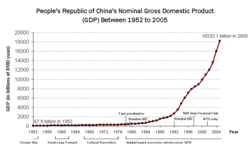Despite Deng's death in 1997, reforms continued under his handpicked successors, Jiang Zemin and Zhu Rongji. In 1997 and 1998, large-scale privatization occurred, in which all state enterprises, except a few large monopolies, were liquidated and their assets sold to private investors. Between 2001 and 2004, the number of state-owned enterprises decreased by 48 percent. During the same period, Jiang and Zhu also reduced tariffs, trade barriers and regulations, reformed the banking system, dismantled much of the Mao-era social welfare system, forced the PLA to divest itself of military-run businesses, reduced inflation, and joined the World Trade Organization. These moves invoked discontent among some groups, especially laid off workers of state enterprises that had been privatized.
The domestic private sector first exceeded 50% of GDP in 2005 and has further expanded since. However, some state monopolies still remained, such as in petroleum and banking.
The Hu-Wen Administration has slowed the progress of the reforms. The government has adopted more egalitarian and populist policies; It increased subsidies and control over the health care sector, halted privatization and adopted a loose monetary policy, which lead to the formation of a property bubble in which property prices tripled. The privileged state sector was the primary recipient of government investment, which under the new administration, promoted the rise of large "national champions" which could compete with large foreign corporations.
China´s economic performance since reform
China's economic growth since the reform has been very rapid, exceeding the East Asian Tigers. Economists estimate China's GDP growth from 1978 to 2005 at 9.5% a year. Since the beginning of Deng Xiaoping's reforms, China's GDP has risen tenfold. The increase in total factor productivity (TFP) was the most important factor, with productivity accounting for 40.1% of the GDP increase, compared with a decline of 13.2% for the period 1957 to 1978—the height of Maoist policies. Per capita incomes grew at 6.6% a year. Average wages rose sixfold between 1978 and 2005 while absolute poverty declined from 41% of the population to 5% from 1978 to 2001.Some scholars believed that China's economic growth has been understated, due to large sectors of the economy not being counted.
Reason for successScholars have proposed a number of theories to explain the success of China's economic reforms in its move from a planned economy to a socialist market economy despite unfavorable factors such as the troublesome legacies of socialism, considerable erosion of the work ethic, decades of anti-market propaganda, and the "lost generation" whose education disintegrated amid the disruption of the Cultural Revolution. One notable theory is that decentralization of state authority allowed local leaders to experiment with various ways to privatize the state sector and energize the economy. Although Deng was not the originator of many of the reforms, he gave approval to them. Another theory focuses on internal incentives within the Chinese government, in which officials presiding over areas of high economic growth were more likely to be promoted. Scholars have noted that local and provincial governments in China were "...hungry for investment" and competed to reduce regulations and barriers to investment to boost economic growth and the officials' own careers. A third explanation believes that the success of the reformists are attributable to Deng's cultivation of his own followers in the government.



